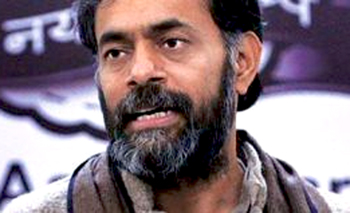Mumbai, Mar 5: AAP leaders Yogendra Yadav and Prashant Bhushan were ready to quit from the party's top decision-making body but got sacked by loyalists of Delhi Chief Minister Arvind Kejriwal, senior AAP leader Mayank Gandhi has said.
 Gandhi, one of the 19 who attended a party leadership meeting Wednesday where the two were dropped from the Political Affairs Committee (PAC), quoted Yadav and Bhushan as saying that Kejriwal did not want them in the PAC.
Gandhi, one of the 19 who attended a party leadership meeting Wednesday where the two were dropped from the Political Affairs Committee (PAC), quoted Yadav and Bhushan as saying that Kejriwal did not want them in the PAC.
Both were willing to stay out of the PAC provided they were not singled out and also put forth two formulae for the purpose, Gandhi said.
Yadav and Bhushan suggested a reconstitution of the nine-member PAC with new members elected through voting in which they would not contest.
Second, the PAC could continue in the present form but with Yadav and Bhushan not attending its meetings.
"The meeting broke for some time and Manish (Sisodia) and others conferred with the Delhi team of Ashish Khetan, Ashutosh, Dilip Pandey and others.
"After reassembling, Manish (Sisodia) proposed a resolution that Yadav and Bhushan be removed from the PAC and it was seconded by Sanjay Singh," Gandhi said in his blog Wednesday night.
Sisodia, who is Delhi's deputy chief minister, as well as Khetan, Ashutosh, Pandey and Sanjay Singh are all considered Kejriwal loyalists. Some of them made stinging comments agains Bhushan and Yadav ahead of the meeting, virtually accusing them of staging a revolt against Kejriwal.
Gandhi said he abstained from voting along with some others at the National Executive meeting as he had agreed that Bhushan and Yadav may remain out of the PAC and get some other responsibilities as Kejriwal needed a smoother working of the PAC.
"I was taken aback by the resolution of removing them publicly, especially as they themselves were willing to leave. Also, this decision to sack them was against the overwhelming sentiments of volunteers from all over the world," Gandhi said.
Hence, though he (Gandhi) agreed Yadav and Bhushan should step down from the PAC, the manner and intention behind the resolution was not acceptable and so he abstained from voting.
Gandhi, who is convenor of the Maharashtra unit of the Aam Aadmi Party, argued that his revelations did not tantamount to a revolt or a publicity ploy and he was prepared for any repercussions.






Comments
Add new comment